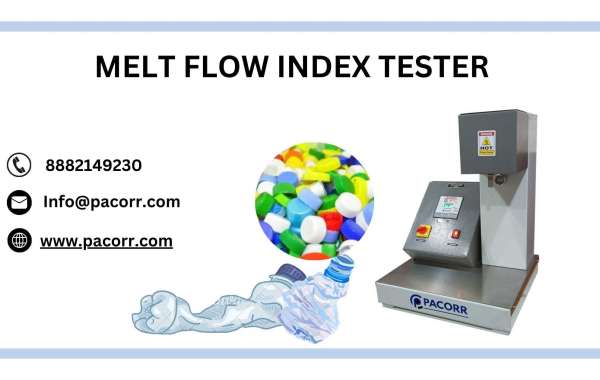What is a Melt Flow Index Tester?
The Melt Flow Index Tester measures the rate of extrusion of molten plastics through a die of a specified length and diameter under a fixed weight within a given time span. The result, termed as the Melt Flow Index Tester, is crucial in determining the usability of plastic in various manufacturing processes. The MFR is indicative of the material's viscosity, molecular structure, and more, making it a vital parameter in plastic production.
How Does the Melt Flow Index Tester Work?
A typical Melt Flow Index Tester heats a sample of plastic material to a designated temperature until it melts. Once molten, the material is then forced through a die using a specific weight for ten minutes. The amount of extruded plastic, measured in grams, gives us the MFR. Simplified, the process involves heating, loading, and measuring - each step critical to ensuring the accuracy of the test results.
The Importance of MFI in the Plastics Industry
Quality Control: By measuring MFI, manufacturers ensure that every batch of plastic material meets stringent quality standards, necessary for producing reliable and consistent products.
Material Selection: Different applications require plastics with specific properties. MFI helps in selecting the right material that will perform optimally under set conditions.
Research and Development: For those developing new plastic materials, MFI testing is indispensable. It allows researchers to tweak polymer properties for desired performance characteristics.
Advanced Features in Modern Melt Flow Index Tester
As technology advances, so do Melt Flow Index Tester. Modern devices come equipped with features like automated timers, precise temperature controls, and even computerized data collection. These enhancements not only improve the accuracy of measurements but also make the device easier and more efficient to use.
Conclusion
The Melt Flow Index Tester is more than just a piece of equipment; it's a fundamental tool that ensures the plastics used in everyday products are up to the mark. Understanding and utilizing the capabilities of a Melt Flow Index Tester can lead to significant improvements in product quality and innovation in material science. Whether you're a manufacturer, a researcher, or simply curious about plastic production, the insights provided by a Melt Flow Index Tester are invaluable.
FAQ
Q1: What is Melt Flow Rate?
A1: Melt Flow Index Tester is a measure of the rate at which a thermoplastic material extrudes through a die when subjected to a specified load and temperature. It's expressed in grams per ten minutes.
Q2: Why is MFI important in selecting materials?
A2: MFI indicates the fluidity of a plastic under heat and pressure, which affects its processing and end-use performance. Higher MFI values suggest the material flows easily, suitable for processes like film blowing or sheet extrusion.
Q3: How does temperature affect MFI testing?
A3: Temperature is critical in MFI testing because it directly influences the viscosity and flow characteristics of the plastic. Each material has a specific testing temperature that must be accurately maintained to ensure valid results.
Q4: Can MFI testing predict product performance?
A4: While Melt Flow Index Testing provides valuable information about material flow properties, it does not directly predict product performance. Other tests and evaluations are necessary to fully understand a material's suitability for specific applications.
Q5: Where can I find Melt Flow Index Tester on Pacorr.com?
A5: You can view our range of Melt Flow Index Testing by visiting the 'Products' section on our website. We offer both standard and advanced models to suit various testing needs.







